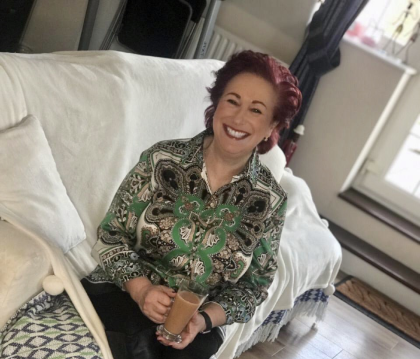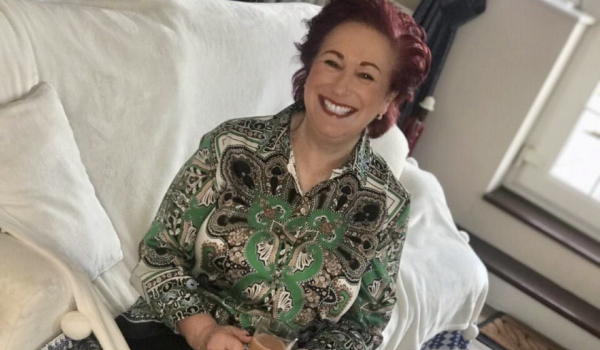My cancer journey began in June 2014, at the age of 52, after approximately eight months of so called bad luck!
I was diagnosed with a rare breast cancer and it was during this surgery that a second cancer was found. After many scans and tests I was given the shocking and heartbreaking diagnosis that I also had stage 4 serous ovarian cancer.
It turned out that both my cancers had been triggered by the BRCA1 gene mutation that I had no idea I was carrying or that you can inherit from your father.

I thought I was aware of ovarian cancer
In the eight months leading up to these diagnoses, I was experiencing what I now know are key ovarian cancer symptoms. I thought I was aware of ovarian cancer symptoms - a bloated stomach and constant water infections. But I had neither.
What I did have were distinct bowel changes and a low sharp abdominal pain. I had a virtual colonoscopy to investigate this pain, and although the specialist initially suspected bowel cancer it was ruled out.
I was told it was diverticulitis and to go away, nothing was wrong and I wouldn’t need another colonoscopy for five years. No simple and cheap CA125 blood test was done at this time, which I know now would have made such a difference because early diagnosis is so vital with ovarian cancer.
I also developed terrible arthritis in my hands with fingers curling more each day and a very painful frozen shoulder. I learnt that all these symptoms actually had a name - paraneoplastic syndrome. The ovarian cancer had caused these problems and was the reason treatment wasn’t being effective.
Not one specialist I saw linked all these symptoms together until after I was diagnosed and therefore the cancer had time to spread. The cancer was growing outside of my bowel, in the peritoneum and elsewhere and I learnt very quickly that my only hope was aggressive chemotherapy.
My other shoulder had now frozen after the breast surgery. I was absolutely terrified of the chemo I was going to have to face and BRCA was mentioned for the very first time along with a new drug waiting for approval called olaparib - a PARP inhibitor. But my oncologist feared I would not make my first treatment.
From no hope to every hope
I was initially told the ovarian cancer was inoperable and there was no point in having the planned radiotherapy for the breast cancer. So, I had eight sessions of harsh chemotherapy and then continued for almost three years on three-weekly Avastin until it affected my kidneys too much.
The cancer returned but thankfully by now olaparib had been approved by NICE and my consultant decided I could now have surgery.
I had a radical hysterectomy but I then got sepsis and clostridium difficile and ended up in ICU and spent several weeks in hospital. I reluctantly then had to go back on chemo purely because it was the only way I could access the olaparib that I was determined to take…That was six years ago!
So I went from no hope, to some hope and now to every hope!
Defying the statistics – but what’s changed?
Almost ten years later and I've defied the dreadful five year statistics.
As I look back, although I'm pleased to see better awareness and access to treatments, I know more still needs to be done. Women continue to be misdiagnosed with IBS and diverticulitis. They continue to be diagnosed at a later stage. And there continues to be a lack of understanding about the importance of family history and genetics.
Finding out soon after my diagnosis that my daughter Gaby was also a BRCA carrier broke our hearts and protecting her has driven me to keep her safe.
At the tender age of 26 she had the courage to have a risk reducing mastectomy. I never imagined I would be here for her surgery but I have been able to support her for four!
Knowing more about BRCA and the importance of family history – on both sides
I've made it my mission to find out everything I can about BRCA, how it is inherited 50/50 to any child male or female and how a carrier can change their destiny with preventative surgeries and how to stop this devastating deathly inheritance.
Now we have the knowledge we also have the power to keep the next generation safe.
It was a shock to find out that I’d inherited the gene mutation from my dad rather than my mum because when I had mammograms I'd been told not to worry about cancer in his side of the family despite an aunt dying of breast cancer at only 52.
I know now that just being Jewish put me at a greater risk and therefore I was denied the choice of preventative surgery.
Knowing this and the difference this knowledge could have made to my life, Gaby and myself have campaigned to spread awareness and knowledge in every way we can - and we even got my lovely late father to help us campaign for better awareness of family history, specifically reminding women they can inherit the BRCA gene from their father’s side too.
Progress is still needed
I’d like to see more focused awareness campaigns highlighting ovarian cancer signs and symptoms and more genetics education introduced at school.
Our future generations need to be better informed so that they can have the choice to take necessary steps to protect themselves because being diagnosed at the earliest opportunity is when the cancer is easier to treat.
Ovarian cancer was my primary cancer, but it was missed. Not one specialist I saw was ovarian cancer or BRCA aware. We can’t go on missing this cancer.
This is why I work closely with Target Ovarian Cancer, urging politicians to invest in awareness campaigns and education on ovarian cancer. I also support the charity by reviewing its information on hereditary cancer to help women understand their genetic risk better, alongside pulling together recommendations to improve NICE guidelines for better access to diagnosis and treatment.
Target Ovarian Cancer, and many others like them, are doing everything they can to stop this disease devastating lives, but we still need to see more done.
This June 2024 – I will be reaching a milestone
I honestly didn’t think I’d be here now, that I’d live to see 2024. I credit my wonderful oncologist Prof Justin Stebbing with my life. The treatment I had over those first years was gruelling, but it gave me my future.
When I look back at everything that’s happened in the last ten years, all the wonderful people I’ve met through this awful disease, the community we’ve built so no one feels alone, and the difference we have made I feel hopeful for women in the future.
And that’s something I aspire for every woman living with an ovarian cancer diagnosis to feel. Hopeful.
If you’ve been affected by this story and would like to speak to a specialist nurse, you can call our dedicated support line on 020 7923 5475 or contact us: [email protected]. We're open from 9am until 5pm, Monday to Friday.
If reading this story has helped you, join the Ovarian Cancer Community to connect with more people affected by ovarian cancer: www.targetovariancancer.org.uk/onlinecommunity



